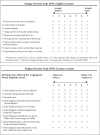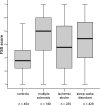Validation of the fatigue severity scale in a Swiss cohort
- PMID: 19014080
- PMCID: PMC2579971
- DOI: 10.1093/sleep/31.11.1601
Validation of the fatigue severity scale in a Swiss cohort
Abstract
Background: Fatigue is highly prevalent and has a negative impact on quality of life and performance in a variety of disorders. The 9-item Fatigue Severity Scale (FSS) is one of the most commonly used self-report questionnaires to measure fatigue, but has only been validated in small sample-sized studies and in single disorders.
Objective: To validate the FSS in healthy subjects and different disorders known to be commonly associated with fatigue.
Material and methods: The FSS was administered to 454 healthy subjects, 188 patients with multiple sclerosis (MS), 235 patients with recent ischemic stroke, and 429 patients with sleep-wake disorders including narcolepsy with cataplexy (n=22), restless legs syndrome (RLS) (n=79), sleep apnea (n=108), insomnia (n=62), parasomnia (n=25), excessive daytime sleepiness/hypersomnia of other origin (n=84, and other sleep-wake disorders (n=49.
Results: FSS scores were 4.66 +/- 1.64 (mean +/- SD) in patients with MS, 3.90 +/- 1.85 in patients after ischemic stroke, and 4.34 +/- 1.64 in patients with sleep-wake disorders. Compared to patients, values were significantly lower in healthy subjects (3.00 +/- 1.08, P < 0.01). Scores did not correlate with gender, age, or education. Item analysis showed an excellent internal consistency and reliability (Cronbach alpha = 0.93). Test-retest variability was assessed in 104 healthy subjects, showing stable values over time (2.94 +/- 0.90 vs. 2.90 +/- 0.74; P = 0.27).
Conclusions: This first validation of a fatigue scale in a large sample size demonstrates that the FSS is a simple and reliable instrument to assess and quantify fatigue for clinical and research purposes.
Figures
References
-
- Chaudhuri A. Fatigue in neurological disorders. Lancet. 2004;363:978–88. - PubMed
-
- Krupp LB, et al. Fatigue therapy in multiple sclerosis: results of a double-blind, randomized, parallel trial of amantadine, pemoline, and placebo. Neurology. 1995;45:1956–61. - PubMed
-
- Branas P, et al. Treatments for fatigue in multiple sclerosis: a rapid and systematic review. Health Technol Assess. 2000;4:1–61. - PubMed
-
- Zifko UA. Management of fatigue in patients with multiple sclerosis. Drugs. 2004;64:1295–1304. - PubMed
-
- Lichstein KL. Fatigue and sleep disorders. Behav Res Ther. 1997;35:733–40. - PubMed
Publication types
MeSH terms
LinkOut - more resources
Full Text Sources
Other Literature Sources
Medical



